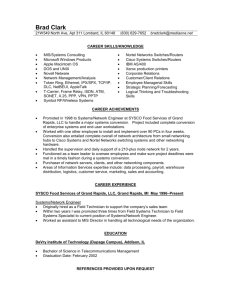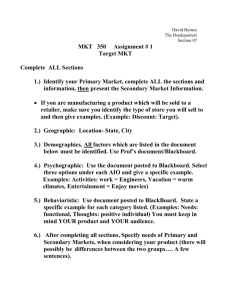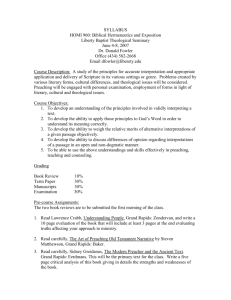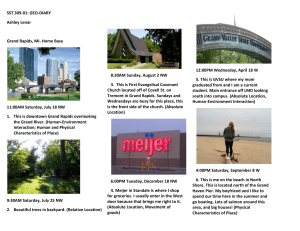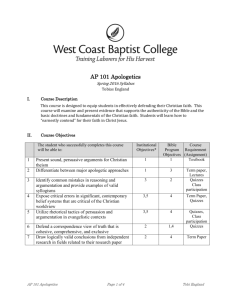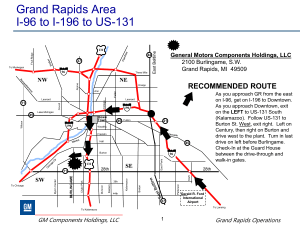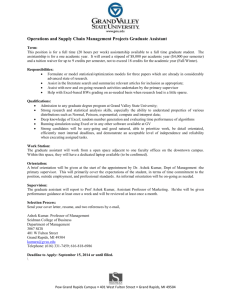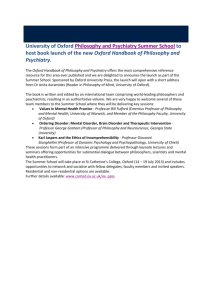Course Syllabus - Tyndale University College & Seminary
advertisement
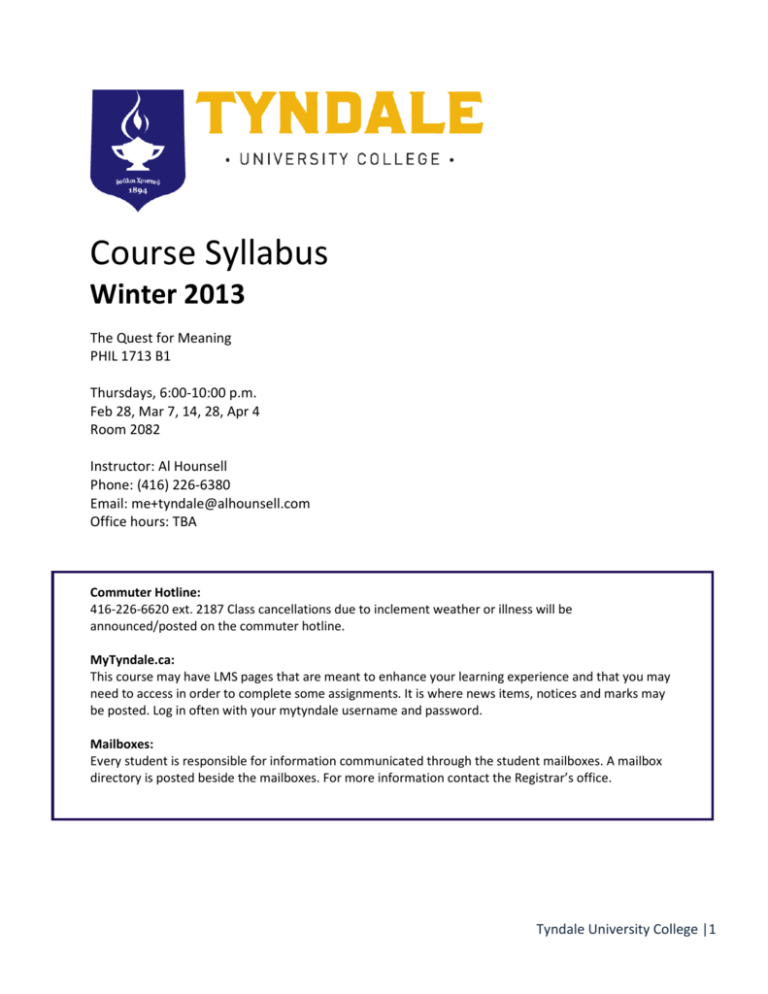
Course Syllabus Winter 2013 The Quest for Meaning PHIL 1713 B1 Thursdays, 6:00-10:00 p.m. Feb 28, Mar 7, 14, 28, Apr 4 Room 2082 Instructor: Al Hounsell Phone: (416) 226-6380 Email: me+tyndale@alhounsell.com Office hours: TBA Commuter Hotline: 416-226-6620 ext. 2187 Class cancellations due to inclement weather or illness will be announced/posted on the commuter hotline. MyTyndale.ca: This course may have LMS pages that are meant to enhance your learning experience and that you may need to access in order to complete some assignments. It is where news items, notices and marks may be posted. Log in often with your mytyndale username and password. Mailboxes: Every student is responsible for information communicated through the student mailboxes. A mailbox directory is posted beside the mailboxes. For more information contact the Registrar’s office. Tyndale University College |1 I. COURSE DESCRIPTION: This course is an introduction to the perennial issues in Western philosophy, such as knowledge and skepticism, the existence of God, the problem of evil, freedom of the will and the foundations of morality. Emphasis is placed on critical thinking and the development of understanding through reasoned argument. II. COURSE OBJECTIVES: • • • To discuss the nature and importance of a worldview, including the relationship between epistemology, metaphysics, and ethics. To survey the main philosophical and intellectual trends in the history of Western thought with a view to tracing out how these trends have influenced (are influencing) the modern world. To examine some specific issues in the history of Western thought, e.g., dualism and materialism, free will versus determinism, the nature and limits of knowledge, the existence of God, and rival ethical theories. III. REQUIRED TEXTS: Ronald H. Nash, Life’s Ultimate Questions: An Introduction to Philosophy (Grand Rapids, MI: Zondervan, 1999). 395 pp. This text is available for purchase in the Tyndale bookstore. There may also be periodic readings placed on reserve in the library; these will be assigned as the semester progresses. IV. COURSE EVALUATION: 5 % – Memory quizzes ==> one per class 10 % – Attendance, Participation, and Discussion 50 % – Weekly assignments ==> To be handed in each class at 6 p.m. 35 % – 2 Philosophical Papers ==> 1st due March 28th, 2nd due after final class Students are responsible to keep a backup print copy of all assignments. - your attendance policy should be clearly stated in this section Tyndale University College |2 V. COURSE OUTLINE: DATE AND TOPIC TEXTBOOK READINGS Feb 28th – Introduction and Overview, Worldview Thinking, Naturalism, Plato, Aristotle, and the Logic of God Incarnate Chapters 1–4 Mar 7th – Three Great A’s: Augustine, Anselm, and Aquinas; Possible Worlds, Middle Knowledge and the Doctrine of Hell Chapters 6, 7, 9 Mar 14th – The Nature and Limits of Knowledge; Reformed Epistemology and Foundationalism Chapters 10–12 Mar 28th – The Existence and Nature of God, the Metaphysics of Free Will Chapter 13–15 Paper #1 due at 6.00pm Apr 17th – Rival Theories of Ethics, Soul and Body, Life After Death Chapters 16–18 WEEKLY ASSIGNMENTS A. FOR CLASS ONE 1. Memorize the title, biblical reference, and passage below, and be ready for a short quiz on this information at some point during class. Title: Reference: Passage: Reflection: Be-Aware of Philosophy Colossians 2: 8 See to it that no one takes you captive through hollow and deceptive philosophy, which depends on human tradition and the basic principles of this world rather than on Christ. (NIV) Does this verse teach that philosophy should be avoided altogether? Can you beware of “hollow and deceptive philosophy” without being aware of it? Tyndale University College |3 2. Homework assignment to be handed in at 6 p.m. Carefully read chapters 1–4 from the text, and in no more than two or three single-spaced typewritten pages, respond to the following questions: Chapter 1 a. Discuss the nature and importance of ‘worldview thinking’. b. Create a detailed list of your own worldview beliefs as they currently stand. Identify the possible inconsistencies or problems in this list. Chapter 2 c. What is naturalism? Explain why naturalism is a self-defeating or self-refuting theory. Chapter 4 d. Briefly explain how Aristotle’s distinction between essential and nonessential properties might be used to defend the coherence of the Incarnation. B. FOR CLASS TWO 1. Memorize the title, biblical reference, and passage below, and be ready for a short quiz on this information at some point during class. Title: Reference: Passage: Reflection: Develop a Christian Mind Romans 12: 2 Do not conform any longer to the pattern of this world, but be transformed by the renewing of our mind. Then you will be able to test and approve what God’s will is — his good, pleasing and perfect will. (NIV) What do you think “the pattern of this world” refers to? (Hint: consider Paul’s solution to being conformed to this pattern?) 2. Homework assignment to be handed in at 6 p.m. Carefully read chapters 6, 7, and 9 in the textbook, and in no more than two or three single-spaced typewritten pages, respond to the following questions: Chapter 6 a. In a paragraph or two, sum up Plato’s and Aristotle’s views on how we know Forms or universals. b. How does Augustine think we know the Forms? Who has the best theory: Plato, Aristotle, or Augustine? Explain your answer. Chapter 7 c. Select a current scientific or philosophical objection to the Christian faith. Explain how Aquinas’ distinction between faith and reason might help answer this objection. d. Would appealing to the double theory of truth be an adequate response to the objection you have selected? Why or why not? Tyndale University College |4 C. FOR CLASS THREE 1. Memorize the title, biblical reference, and passage below, and be ready for a short quiz on this information at some point during class. Title: Reference: Passage: Reflection: The Role of Argument 2 Corinthians 10: 5 We demolish arguments and every pretension that sets itself up against the knowledge of God, and we take captive every thought to make it obedient to Christ. (NIV) What is an argument? How would one go about destroying such a thing? 2. Homework assignment to be handed in at 6 p.m. Carefully read chapters 10–12 in the textbook, and in no more than two or three single-spaced typewritten pages, respond to the following questions: Chapter 10 a. What is postmodernism? b. Is postmodernism consistent with the Christian faith? Explain your answer. Chapters 11 and 12 c. Explain why Kant’s epistemology makes knowledge of God impossible. Do you think we have this sort of knowledge? If so, what is your response to Kant? D. FOR CLASS FOUR 1. Memorize the title, biblical reference, and passage below, and be ready for a short quiz on this information at some point during class. Title: Reference: Passage: Reflection: Evidence for God Romans 1: 20 For since the creation of the world God’s invisible qualities — his eternal power and divine nature — have been clearly seen, being understood from what has been made, so that men are without excuse. (NIV) What does this verse suggest about the possibility of offering arguments or proofs for the existence of God? Can it be done or not? 2. Homework assignment to be handed in at 6 p.m. Carefully read chapters 13–15 in the textbook, and in no more than two or three single-spaced typewritten pages, respond to the following questions: Chapter 14 a. Is the Christian doctrine of the Incarnation evidence that God can do what is logically impossible? Why or why not? Tyndale University College |5 b. Can God know our future free actions? Then are those actions really free? Explain your answers. Chapter 15 c. In what sense, if any, do you think we possess free choice? E. FOR CLASS FIVE 1. Memorize the title, biblical reference, and passage below, and be ready for a short quiz on this information at some point during class. Title: Reference: Passage: Reflection: Defend the Faith 1 Peter 3: 15 But in your hearts set apart Christ as Lord. Always be prepared to give an answer to everyone who asks you to give the reason for the hope that you have. But do this with gentleness and respect. (NIV) Could you provide an answer right now if someone asked you for such a reason? What would your answer be? 2. Homework assignment to be handed in at 6 p.m. Carefully read chapters 16–18 in the textbook, and in no more than two or three single-spaced typewritten pages, respond to the following questions: Chapters 16–18 a. What is utilitarianism? Is utilitarianism a just ethical theory? b. Which views on the nature of human persons are consistent with survival after death? Which, if any, of these views could a Christian theist embrace? VI. ACADEMIC INTEGRITY: Integrity in academic work is required of all our students. Academic dishonesty is any breach of this integrity, and includes such practices as cheating (the use of unauthorized material on tests and examinations), submitting the same work for different classes without permission of the instructors, using false information (including false references to secondary sources) in an assignment, improper or unacknowledged collaboration with other students, and plagiarism. Tyndale University College & Seminary takes seriously its responsibility to uphold academic integrity, and to apply consequences for academic dishonesty. Students are advised to consult the Academic Calendar http://www.tyndale.ca/registrar/calendar for more information on this policy and its application to their work in this course. Tyndale University College |6 VII. BIBLIOGRAPHY: History of Philosophy Primary Sources Aquinas, Thomas, Introduction to St. Thomas Aquinas, edited with an introduction by Anton C. Pegis (New York: The Modern Library, 1945). Aristotle, A New Aristotle Reader, edited by J. L. Ackrill (Princeton: Princeton University Press, 1987). Augustine, What Augustine Says, edited by Norman L. Geisler (Grand Rapids: Baker, 1982). Barnes, Jonathan, translator and editor, Early Greek Philosophy (London: Penguin Books, 1987). Cahn, Steven, editor, Classics of Western Philosophy. 2nd ed. (Indianapolis: Hackett, 1977). Descartes, Rene, Discourse on Method and The Meditations, translated with an introdution by F. E. Sutcliffe (London: Penguin Books, 1968). Hume, David, Dialogues Concerning Natural Religion, edited with an introduction by Norman Kemp Smith (Indianapolis: Bobbs-Merrill, 1962). — . Enquiries Concerning Human Understanding and Concerning the Principles of Morals, introduction and analytical index by L. A. Selby-Bigge with text revised and notes by P. H. Nidditch (Oxford: Clarendon Press, 1975). Hyman, Arthur and James J. Walsh, Philosophy in the Middle Ages: The Christian, Islamic, and Jewish Traditions, 2nd ed. (Indianapolis: Hackett, 1973). Kant, Immanuel, A Critique of Pure Reason. translated by Norman Kemp Smith (New York: St. Martin’s Press, 1929). Leibniz, G.W., Philosophical Essays edited and translated by Roger Ariew and Daniel Garber (Indianapolis: Hackett, 1989). Locke, John, An Essay Concerning Human Understanding, introduction by Roger Woolhouse (London: Penguin Books, 1998). Mill, John Stuart, Utilitarianism, edited with an introduction by George Sher (Indianapolis: Hackett, 1979). Plato, The Republic, translated by G. M. A. Grube (Indianapolis: Hackett, 1974). — . Five Dialogues: Euthyphro, Apology, Crito, Meno, Phaedo, translated by G. M. A. Grube (Indianapolis: Hackett, 1981). Secondary Sources Copleston, Frederick C., A History of Philosophy, 9 vols. (New York: Doubleday, 1946-1974). — . Medieval Philosophy (London: Methuen, 1952). Gaarder, Jostein, Sophie’s World: A Novel About the History of Philosophy (New York: Berkley Books, 1994). Kirk, G. S. and J. E. Raven, The Presocratic Philosophers, (Cambridge: Cambridge University Press, 1969). Körner, S., Kant, (London: Penguin Books, 1955). Santas, Gerasimos Xenophon, Socrates: Philosophy in Plato’s Early Dialogues (London: Routledge, 1979). Walker, Ralph C. S., Kant (London: Routledge, 1978). Wolterstorff, Nicholas. John Locke and the Ethics of Belief. Cambridge: Cambridge University Press, 1996. Woolhouse, R. S., Descartes, Spinoza, Leibniz: The Concept of Substance in Seventeenth Century Metaphysics (London: Routledge, 1993). Yandell, Keith E., Hume’s “Inexplicable Mystery” (Philadelphia: Temple University Press, 1990). Tyndale University College |7 World View Thinking Geisler, Norman L. and William D. Watkins, Worlds Apart (Grand Rapids: Baker, 1989). Hasker, William, Metaphysics: Constructing a World View (Downers Grove: InterVarsity, 1983). Lewis, C. S., Miracles (New York: Macmillan, 1960). Nash, Ronald H., Faith and Reason (Grand Rapids: Zondervan, 1988). — . Worldviews in Conflict (Grand Rapids: Zondervan, 1992). Phillips, Gary and William E. Brown, Making Sense of Your World View (Chicago: Moody Press, 1991). Reformed Epistemology Clark, Kelly, Return To Reason (Grand Rapids: Eerdmans, 1990). Cowan, Steven B., Five Views on Apologetics (Grand Rapids: Zondervan, 2000). Davis, Stephen T., God, Reason, and Theistic Proofs (Grand Rapids: Eerdmans, 1997). Plantinga, Alvin, Warranted Christian Belief (New York: Oxford University Press, 2000). Plantinga, Alvin and Nicholas Wolterstorff. Faith and Rationality (Notre Dame: University of Notre Dame Press, 1983). Wood, W. Jay. Epistemology: Becoming Intellectually Virtuous (Downers Grove: InterVarsity Press, 1998). Existence of God Alston, William P. Perceiving God (Ithaca: Cornell University Press, 1991). Behe, Michael J., Darwin’s Black Box: The Biochemical Challenge to Evolution (New York: Free Press, 1996). Craig, William Lane, The Existence of God and the Beginning of the Universe (San Bernardino, CA: Here’s Life, 1979). — . The Kalam Cosmological Argument (New York: Barnes and Noble, 1980). — . Apologetics: An Introduction (Chicago: Moody Press, 1984). — . Reasonable Faith: Christian Truth and Apologetics (Wheaton, IL: Crossway Books, 1994). Craig, William Lane and Quentin Smith, Theism, Atheism, and Big Bang Cosmology (Oxford: Clarendon Press, 1993). Davis, Stephen T., God, Reason, and Theistic Proofs (Grand Rapids: Eerdmans, 1997). Geivett, R. Douglas, Evil and the Evidence for God (Philadelphia: Temple University Press, 1993). Mavrodes, George, Belief in God. 1970. Reprint. (Lanham: Univ Press of America, 1981). Moreland, J. P., Scaling the Secular City (Grand Rapids: Baker, 1987). Nash, Ronald H., Faith and Reason (Grand Rapids: Zondervan, 1988). Swinburne, Richard, Is There A God? (Oxford: Oxford University Press, 1996). — . The Existence of God. (Oxford: Oxford University Press, 1979). Yandell, Keith E., The Epistemology of Religious Experience (Cambridge: Cambridge University Press, 1995). Tyndale University College |8 Nature of God Craig, William Lane, The Only Wise God (Grand Rapids: Baker, 1987). Morris, Thomas V., Our Idea of God: An Introduction to Philosophical Theology (Notre Dame: University of Notre Dame Press, 1991). — . Anselmian Explorations: Essays in Philosophical Theology (Notre Dame: University of Notre Dame Press, 1987). — . The Logic of God Incarnate (Ithaca, N.Y.: Cornell University Press, 1986). Nash, Ronald H., The Concept of God (Grand Rapids: Zondervan, 1983). Pinnock, Clark, et al., The Openness of God (Downers Grove: InterVarsity Press, 1994). Plantinga, Alvin, Does God Have a Nature? (Milwaukee: Marquette University Press, 1980). Swinburne, Richard, The Christian God (Oxford: Oxford University Press, 1994). — . The Coherence of Theism (Oxford: Oxford University Press, 1977). Wierenga, Edward R., The Nature of God: An Inquiry into Divine Attributes (Ithaca: Cornell University Press, 1989). Free Will and Determinism van Inwagen, Peter, Metaphysics (Boulder, CO: Westview Press, 1993). — . An Essay on Free Will (Oxford: Clarendon Press, 1983). Basiner, David and Randall Basinger, eds., Predestination and Free Will: Four Views of Divine Sovereignty and Human Freedom (Downers Grove: InterVarsity Press, 1986). Hasker, William, Metaphysics: Constructing a World View (Downers Grove: InterVarsity, 1983). Plantinga, Alvin, God, Freedom, and Evil (Grand Rapids: Eerdmans, 1974). Ethics Rae, Scott B., Moral Choices: An Introduction to Ethics (Grand Rapids: Zondervan, 1995). Pojman, Louis P., Ethics: Discovering Right and Wrong (Belmont, CA: Wadsworth, 1990). Gensler, Harry J., Ethics: A Contemporary Introduction (London: Routledge, 1998). Mind-Body/Life After Death Habermas, Gary and J. P. Moreland, Immortality: The Other Side of Death (Nashville: Thomas Nelson, 1992). Hasker, William, Metaphysics: Constructing a World View (Downers Grove: InterVarsity, 1983). Moreland, J. P., Scaling the Secular City (Grand Rapids: Baker, 1987). Swinburne, Richard, The Evolution of the Soul (Oxford: Oxford University Press, 1986). Tyndale University College |9
